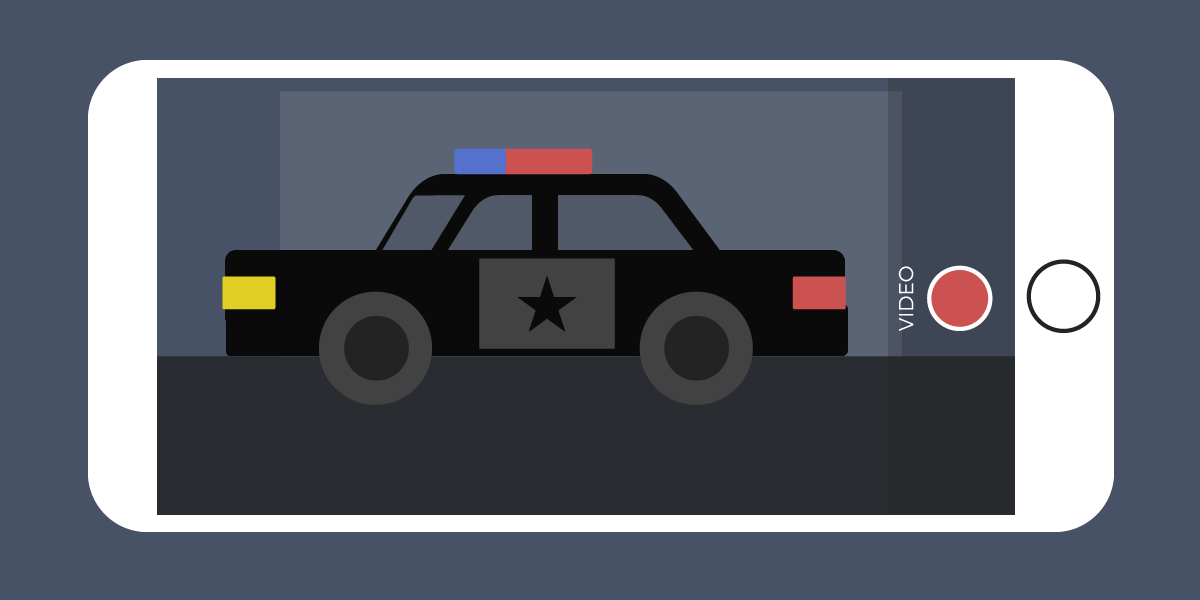Across the United States, Immigration and Customs Enforcement (ICE) has already begun increasing enforcement operations, including highly publicized raids. As immigrant communities, families, allies, and activists think about what can be done to shift policy and protect people, one thing is certain: similar to filming the police as they operate, you have the right to film ICE, as long as you are not obstructing official duties.
Filming ICE agents making an arrest or amassing in your town helps promote transparency and accountability for a system that often relies on intimidation and secrecy and obscures abuse and law-breaking.
While it is crucial for people to help aid in transparency and accountability, there are considerations and precautions you should take. For an in-depth guide by organizations on the frontlines of informing people who wish to record ICE’s interactions with the public, review these handy resources from the hard-working folks at WITNESS and NYCLU.
At EFF, here are our general guidelines when it comes to filming law enforcement, including ICE:
What to Know When Recording Law Enforcement
- You have the right to record law enforcement officers exercising their official duties in public.
- Stay calm and courteous.
- Do not interfere with law enforcement. If you are a bystander, stand at a safe distance from the scene that you are recording.
- You may take photos or record video and/or audio.
- Law enforcement cannot order you to move because you are recording, but they may order you to move for public safety reasons even if you are recording.
- Law enforcement may not search your cell phone or other device without a warrant based on probable cause from a judge, even if you are under arrest. Thus, you may refuse a request from an officer to review or delete what you recorded. You also may refuse to unlock your phone or provide your passcode.
- Despite reasonably exercising your First Amendment rights, law enforcement officers may illegally retaliate against you in a number of ways including with arrest, destruction of your device, and bodily harm. They may also try to retaliate by harming the person being arrested. We urge you to remain alert and mindful about this possibility.
- Consider the sensitive nature of recording in the context of an ICE arrest. The person being arrested or their loved ones may be concerned about exposing their immigration status, so think about obtaining consent or blurring out faces in any version you publish to focus on ICE’s conduct (while still retaining the original video).
Your First Amendment Right to Record Law Enforcement Officers Exercising Their Official Duties in Public
You have a First Amendment right to record law enforcement, which federal courts and the Justice Department have recognized and affirmed. Although the Supreme Court has not squarely ruled on the issue, there is a long line of First Amendment case law from the high court that supports the right to record law enforcement. And federal appellate courts in the First, Third, Fourth, Fifth, Seventh, Eighth, Ninth, Tenth, and Eleventh Circuits have directly upheld this right. EFF has advocated for this right in many amicus briefs.
Federal appellate courts typically frame the right to record law enforcement as the right to record officers exercising their official duties in public. This right extends to private places, too, where the recorder has a legal right to be, such as in their own home. However, if the law enforcement officer is off-duty or is in a private space that you don’t have a right to be in, your right to record the officer may be limited.
Special Considerations for Recording Audio
The right to record law enforcement unequivocally includes the right to take pictures and record video. There is an added legal wrinkle when recording audio—whether with or without video. Some law enforcement officers have argued that recording audio without their consent violates wiretap laws. Courts have generally rejected this argument. The Seventh Circuit, for example, held that the Illinois wiretap statute violated the First Amendment as applied to audio recording on-duty police.
There are two kinds of wiretaps laws: those that require “all parties” to a conversation to consent to audio recording (12 states), and those that only require “one party” to consent (38 states, the District of Columbia, and the federal statute). Thus, if you’re in a one-party consent state, and you’re involved in an incident with law enforcement (that is, you’re a party to the conversation) and you want to record audio of that interaction, you are the one party consenting to the recording and you don’t also need the law enforcement officer’s consent. If you’re in an all-party consent state, and your cell phone or recording device is in plain view, your open audio recording puts the officer on notice and thus their consent might be implied.
Additionally, wiretap laws in both all-party consent states and one-party consent states typically only prohibit audio recording of private conversations—that is, when the parties to the conversation have a reasonable expectation of privacy. Law enforcement officers exercising their official duties, particularly in public, do not have a reasonable expectation of privacy. Neither do civilians in public places who speak to law enforcement in a manner audible to passersby. Thus, if you’re a bystander, you may legally audio record an officer’s interaction with another person, regardless of whether you’re in a state with an all-party or one-party consent wiretap statute. However, you should take into consideration that ICE arrests may expose the immigration status of the person being arrested or their loved ones. As WITNESS puts it: “[I]t’s important to keep in mind the privacy and dignity of the person being targeted by law enforcement. They may not want to be recorded or have the video shared publicly. When possible, make eye contact or communicate with the person being detained to let them know that you are there to observe and document the cops’ behavior. Always respect their wishes if they ask you to stop filming.” You may also want to consider blurring faces to focus on ICE’s conduct if you publish the video online (while still retaining the original version)
Moreover, whether you may secretly record law enforcement (whether with photos, video or audio) is important to understand, given that officers may retaliate against individuals who openly record them. At least one federal appellate court, the First Circuit, has affirmed the First Amendment right to secretly audio record law enforcement performing their official duties in public. On the other hand, the Ninth Circuit recently upheld Oregon’s law that generally bans secret recordings of in-person conversations without all participants’ consent, and only allows recordings of conversations where police officers are participants if “[t]he recording is made openly and in plain view of the participants in the conversation.” Unless you are within the jurisdiction of the First Circuit (Maine, Massachusetts, New Hampshire, Puerto Rico and Rhode Island), it’s probably best to have your recording device in plain view of police officers.
Do Not Interfere With Law Enforcement
While the weight of legal authority provides that individuals have a First Amendment right to record law enforcement, courts have also stated one important caveat: you may not interfere with officers doing their jobs.
The Seventh Circuit, for example, said, “Nothing we have said here immunizes behavior that obstructs or interferes with effective law enforcement or the protection of public safety.” The court further stated, “While an officer surely cannot issue a ‘move on’ order to a person because he is recording, the police may order bystanders to disperse for reasons related to public safety and order and other legitimate law enforcement needs.”
Transparency is Vital
While a large number of deportations is a constant in the U.S. regardless of who is president or which party is in power, the current administration appears to be intentionally making ICE visible in cities and carrying out flashy raids to sow fear within immigrant communities. Specifically, there are concerns that this administration is targeting people already under government supervision while awaiting their day in court. Bearing witness and documenting the presence and actions of ICE in your communities and neighborhoods is important. You have rights, and one of them is your First Amendment-protected right to film law enforcement officers, including ICE agents.
Just because you have the right, however, does not mean law enforcement will always acknowledge and uphold your right in that moment. Be safe and be alert. If you have reason to think your devices might be seized or you may run the risk of putting yourself under surveillance, make sure to check out our Surveillance Self-Defense guides and our field guide to identifying and understanding the surveillance tools law enforcement may employ.



